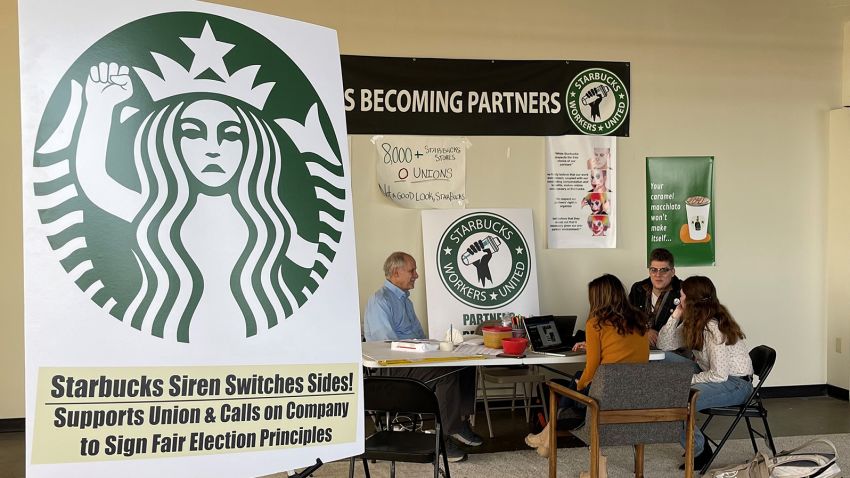A union has won the right to represent US Starbucks workers for the first time.
The vote to unionize at a shop in Buffalo, New York, won by a 19-8 margin. The vote at a second store resulted in a count of 12 opposed versus 8 in favor of the union, but each store’s tally is considered separately, so workers at the second location will not have union representation while those at the first one will.
A third Buffalo store’s votes were inconclusive as of Thursday afternoon. The union was leading the vote at that store 15 to 9, but there seven other ballots challenged and therefore not counted. Six of those challenges were brought by the union, which argued that those workers worked at other Starbucks locations. Those challenges will need to be resolved at a later date before the outcome of that vote is determined.
Starbucks downplayed the significance of its loss, referring to the votes at the three stores as a “split decision.” But the effort to organize Starbucks employees had been closely watched nationally. The company put a major effort into convincing employees that they were better off without a union, but at least in the case of one of the stores, it failed to make its case.
Starbucks has 235,000 employees spread across nearly 9,000 US stores. None so far have been members of a union. Employees, many in their teens and 20s, have been working to organize a union, Starbucks Workers United, an independent affiliate of the Service Employees International Union.
While some workers at US Starbucks franchises, such as kiosks in other stores, belonged to unions, no US employees of Starbucks itself are unionized.
Even though the Buffalo vote represents only about 100 employees spread among the three stores, Starbucks took the organizing effort very seriously, flooding the Western New York city with top executives, including former chairman and CEO Howard Schultz. The company is concerned that the organizing effort could spark others elsewhere. And in fact employees at a Starbucks in Mesa, Arizona, as well as at three other Buffalo stores, have filed to start the process for holding votes in those locations.
In a recent filing with the Securities and Exchange Commission, in a section where Starbucks lists risks to the company, the chain said that “if a significant portion of our employees were to become unionized, our labor costs could increase and our business could be negatively affected by other requirements and expectations that could increase our costs, change our employee culture, decrease our flexibility and disrupt our business.”
Starbucks is also concerned about how its efforts to defeat the union could hurt its reputation. “Our responses to any union organizing efforts could negatively impact how our brand is perceived and have adverse effects on our business, including on our financial results,” Starbucks warned in the same filing.
Unions also placed great importance in the vote at Starbucks as well. The days when unionized manufacturing jobs dominated the US economy are long past, and union membership among businesses has fallen to 6.3% of private sector workers, down from 16.8% in 1983, the first year the Labor Department tracked union membership by industry.
It’s even lower in retail and food services business, two major employment sectors, with only 4.6% or retail workers and only 1.2% of food service employees belonging to a union. Winning the right to represent workers in industries with such low union membership is crucial for unions’ efforts to regain some of their past strength.
“This is a historic moment in time,” said Michelle Eisen, a barista and 11-year veteran at the store in which the union clearly won. “This win is the first step in changing what it means to be a partner at Starbucks, and what it means to work in the service industry more broadly. With a union, we now have the ability to negotiate a contract that holds Starbucks accountable to be the company we know it can be, and gives us a real voice in our workplace.”
But getting Starbucks to sit down with its new union will not be easy. There’s nothing in the law that forces a company to reach a labor deal with a newly recognized union. Union supporters at Buffalo stores said it will take pressure from public officials and customers to force Starbucks to negotiate.
“It’s probably not a fair assumption that they want to come and bargain with us, but I hope they will,” said Lexi Rizzo, another Starbucks employee and organizer.
Besides seeking better pay, the union supporters argue that organizing the workforce is the only way to have their voices heard about the way their stores are run, and to win some better wages for longtime coworkers, who often make only slightly more than new hires.
Starbucks says it offers many benefits that others in the industry do not, including health care coverage for part-time workers and college tuition reimbursement. Starbucks has implemented two wage increases in the past 18 months. Its average wage is more than $12 an hour, the company says, adding that more than half of its US employees earn more than $15 an hour. The company says it has the best retention rate in the industry.
“Every partner matters,” said the company’s statement after the vote, using the term it uses to describe its employees. “It’s how we built the company. And how we will continue to run the company. We will continue to focus on the best Starbucks experience we can deliver for every partner and our customers.”
A note to employees from Rossann Williams, Starbucks’ executive vice president for North America, said these are “preliminary results with no immediate changes to our partner relationship as the NLRB process continues.”
“Starbucks is one of the most respected and admired companies in the world, built by partners in service of partners, customers and neighborhoods all across the country,” she added. “We want every partner to love working at Starbucks. We will keep finding new and better ways to continue leading on wages and benefits, improve our listening and active partnership, and keep building a company that matters.”
Union supporters at the Buffalo Starbucks have complained about the mandatory meetings employees have attended recently with top executives, arguing that they were a form of intimidation. The company said it is simply trying to present its argument that the best way to improve working conditions is to not have a union acting between employees, who Starbucks refers to as “partners,” and management.
Starbucks is “continuously listening to improve the partner experience and treating each other with respect and dignity. And although we will never be perfect, together we will create our best path forward,” said CEO Kevin Johnson in a message to staff this week.
Starbucks had argued that the vote should be held among workers at all 20 stores in Buffalo, not just the three at which the union is trying to organize. The company said that’s because workers often move between stores, and pay and benefits should be the same across the city. The union said that argument was an effort to dilute the vote at the stores where it has the strongest support for unionizing. The union said it challenged six ballots at one store because they were cast by employees who worked at other locations where the union had not made as great an organizing effort.
“If we had petitioned for the whole district, they’d say the vote should be the whole state. If we petitioned for a vote for the whole state, they’d say the vote should be the whole nation,” said Richard Bensinger, an organizer for Starbucks Workers United and former national organizing director of the AFL-CIO.
The union hasn’t even given up hope in the vote at one store, where it appears to have lost. An attorney for the union said it believes some ballots were not counted even though they had been dropped off at the Buffalo office of the National Labor Relations Board, which oversaw the election. It said it believed if those ballots are found there are enough votes that still could mean a victory for the union.

























